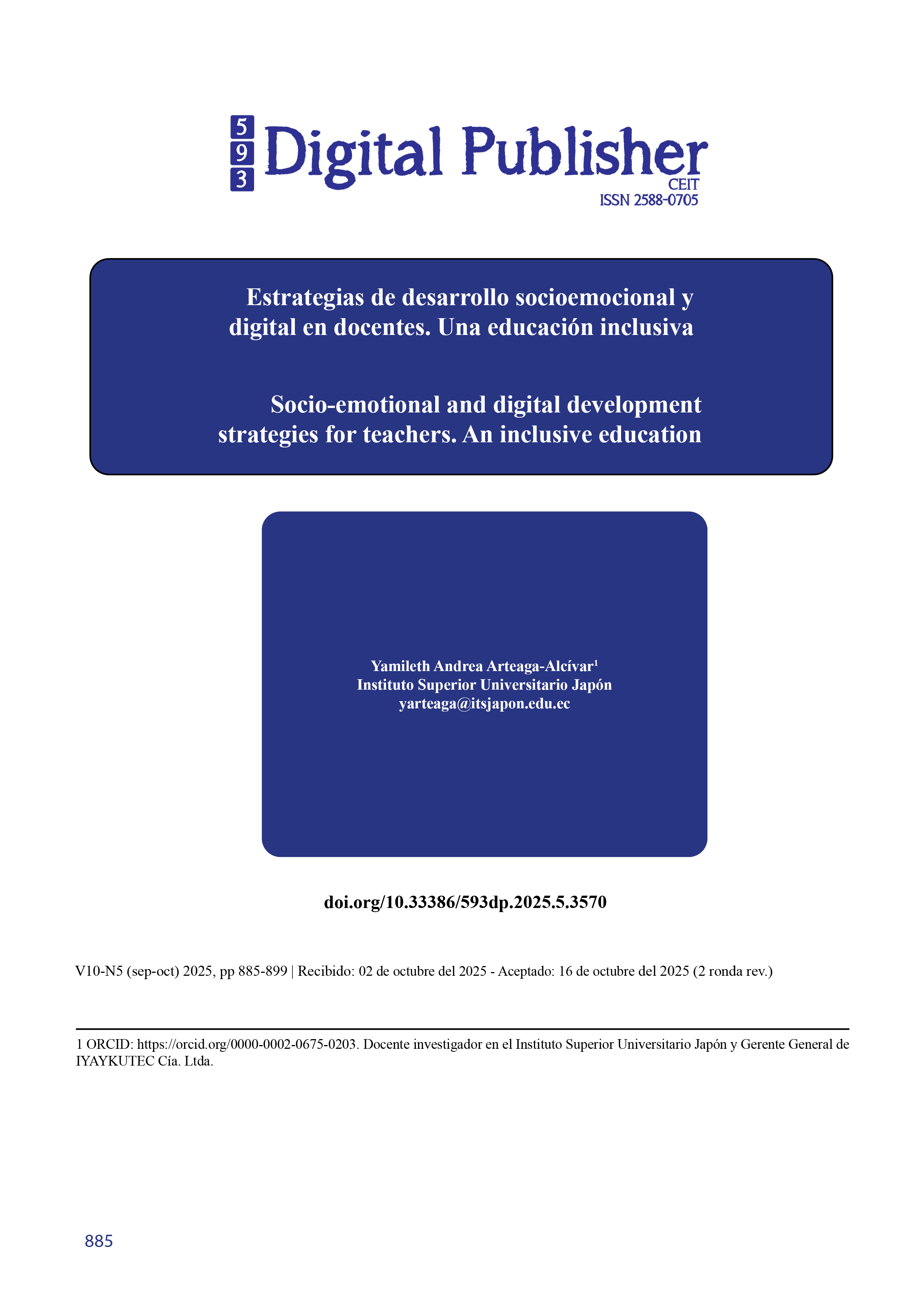Socio-emotional and digital development strategies for teachers. An inclusive education
Main Article Content
Abstract
This study sought to analyze how the inclusion of socio-emotional strategies and digital skills among teachers helped implement inclusive education. This is crucial because it promotes access, participation, and equity in various contexts. A mixed-methods documentary methodology was adopted, comprising a systematic literature review and a bibliometric analysis. The search was conducted in Scopus and Dimensions.ai; after applying open-access and year (2021–2025) filters and removing duplicates, 26 studies were included in the qualitative synthesis following PRISMA. The bibliometric analysis characterized the output by country and subject area, and the qualitative synthesis grouped the studies into three axes: digital, socioemotional, and integration. The results indicated that assistive technologies, adaptive platforms, and artificial intelligence improved accessibility and personalization. On the other hand, clear communication, motivation, and narrative methodologies helped create a better classroom environment and encouraged students to embrace technology. Overall, the integrated interventions reported improvements in the participation of students with Special Educational Needs, in teachers’ acceptance of technology, and in pedagogical coherence. However, gaps persisted: a predominance of technical over socio-emotional emphasis, a scarcity of longitudinal evaluations, and inequalities in infrastructure. It was concluded that working on both dimensions simultaneously was an effective way to establish inclusive practices. Furthermore, training programs should include blended modules, ongoing support, and continuous assessment. It was recommended to expand longitudinal studies, delve deeper into low-connectivity contexts, and validate training models that combine digital accessibility with socio-emotional mediation.
Downloads
Article Details

This work is licensed under a Creative Commons Attribution-NonCommercial-ShareAlike 4.0 International License.
1. Derechos de autor
Las obras que se publican en 593 Digital Publisher CEIT están sujetas a los siguientes términos:
1.1. 593 Digital Publisher CEIT, conserva los derechos patrimoniales (copyright) de las obras publicadas, favorece y permite la reutilización de las mismas bajo la licencia Licencia Creative Commons 4.0 de Reconocimiento-NoComercial-CompartirIgual 4.0, por lo cual se pueden copiar, usar, difundir, transmitir y exponer públicamente, siempre que:
1.1.a. Se cite la autoría y fuente original de su publicación (revista, editorial, URL).
1.1.b. No se usen para fines comerciales u onerosos.
1.1.c. Se mencione la existencia y especificaciones de esta licencia de uso.
References
Age, T., & France, M. (2025). Digital inclusion status of external supervisors of preservice mathematics teachers in an open distance e-learning environment. International Journal of Education and Practice, 13(1), 144–157. https://doi.org/10.18488/61.v13i1.3975
Alcívar Zambrano, F. (2023). Uso de tecnologías de asistencia para la inclusión de estudiantes con discapacidad. Impact Research Journal, 1(1), 29–40. https://doi.org/10.63380/irj.v1n1.2023.12
Amouri, H., Haroud, S., Ouchaouka, L., & Saqri, N. (2025). Acceptability of artificial intelligence in inclusive education: A TAM2-based study among preservice teachers. Frontiers in Artificial Intelligence, 8, 1616327. https://doi.org/10.3389/frai.2025.1616327
Arteaga Alcívar, Y. (2025a). El impacto de la comunicación asertiva en la dinámica del aula: Estrategias para un aprendizaje eficaz. Horizon International Journal, 3(1), 27–39. https://doi.org/10.63380/hij.v3n1.2025.76
Arteaga Alcívar, Y. (2025b). Plataformas de aprendizaje adaptativo y la inclusión educativa: Diseño, implementación y evaluación de la accesibilidad para estudiantes con discapacidad. InnDev, 3(3), 49–63. https://doi.org/10.69583/inndev.v3n3.2024.149
Belda-Medina, J. (2022). Promoting inclusiveness, creativity and critical thinking through digital storytelling among EFL teacher candidates. International Journal of Inclusive Education, 26(2), 109–123. https://doi.org/10.1080/13603116.2021.2011440
Belkbir, R. (2024). Integrating the 6Cs in Moroccan higher education: A framework for inclusive AI learning design. Arab World English Journal, 15(3), 217–234. https://doi.org/10.24093/awej/vol15no3.13
Chiner, E., Gómez-Puerta, M., Mengual-Andrés, S., & Merma-Molina, G. (2025). Teacher and school mediation for online risk prevention and management: Fostering sustainable education in the digital age. Sustainability, 17(8), 3711. https://doi.org/10.3390/su17083711
Cobeña Cobeña, S. M., & Arteaga Alcívar, Y. (2024). La importancia de la tecnología en la promoción de la educación inclusiva en la primera infancia. INSTA MAGAZINE, 7(1), 13–17. https://doi.org/10.63074/26973308.v7i1.55
de Lima, P., Novato, T., & de Carvalho, M. (2022). Challenges and coping measures in the education of the deaf and hearing impaired in times of pandemic. Revista Brasileira de Educação Especial, 28, 597–618. https://doi.org/10.1590/1980-54702022v28e0055
Espinosa Cevallos, P. A. (2023). Competencias digitales en docentes de educación básica. Ethos Scientific Journal, 1(1), 33–43. https://doi.org/10.63380/esj.v1n1.2023.13
Feng, X., Guan, W., & Xu, E. (2025). The relationship between preschool inclusive teachers’ perception of traditional culture and digital literacy: The chain mediating role of technology acceptance and job insecurity. Acta Psychologica, 258, 105141. https://doi.org/10.1016/j.actpsy.2025.105141
González-González, C., Caballero-Gil, P., García-Holgado, A., García-Peñalvo, F., Molina, J., Castillo-Olivares, J., San Juan, B., García-Cuesta, S., Perdomo, I., & Caballero-Gil, C. (2021). COEDU-IN Project: An inclusive co-educational project for teaching computational thinking and digital skills at early ages. In 2021 IEEE Global Engineering Education Conference (EDUCON) (pp. 1889–1894). IEEE. https://doi.org/10.1109/SIIE53363.2021.9583648
Guaña Moya, J. (2025). Digital transformation in education: Application of artificial intelligence for the development of teaching resources in higher education. Alpha International Journal, 3(1), 31–42. https://doi.org/10.63380/aij.v3n1.2025.72
Guaña-Moya, J., Arteaga-Alcívar, Y. A., Chiluisa-Chiluisa, M., & Begnini-Domínguez, L. F. (2022). Evolution of information and communication technologies in education. In 2022 Third International Conference on Information Systems and Software Technologies (ICI2ST) (pp. 138–144). IEEE. https://doi.org/10.1109/ICI2ST57350.2022.00027
Herrera Pérez, Y. J., & Espinosa Cevallos, P. A. (2024). Impacto de la enseñanza basada en proyectos apoyada por tecnología en el desarrollo de habilidades del siglo XXI en estudiantes de secundaria. Bastcorp International Journal, 3(1), 4–18. https://doi.org/10.62943/bij.v3n1.2024.33
Howorth, S. K., Marino, M. T., Flanagan, S., Cuba, M. J., & Lemke, C. (2024). Integrating emerging technologies to enhance special education teacher preparation. Journal of Research in Innovative Teaching & Learning, Advance online publication. https://doi.org/10.1108/JRIT-08-2024-0208
Marsden, L., Munn, L., Magee, L., Ferrinda, M., St. Pierre, J., & Third, A. (2025). Inclusive online learning in Australia: Barriers and enablers. Education and Information Technologies, 30(4), 5301–5330. https://doi.org/10.1007/s10639-024-13012-3
Medina-García, M., Higueras-Rodríguez, L., García-Vita, M. del M., & Doña-Toledo, L. (2021). ICT, disability, and motivation: Validation of a measurement scale and consequence model for inclusive digital knowledge. International Journal of Environmental Research and Public Health, 18(13), 6770. https://doi.org/10.3390/ijerph18136770
Mera Castillo, D. E. (2023). La influencia de la inteligencia artificial en la personalización del aprendizaje: Perspectivas y desafíos en la educación. Revista Ingenio Global, 2(2), 28–39. https://doi.org/10.62943/rig.v2n2.2023.64
Miaomiao, W., DeWitt, D., Mohamad Nazry, N. N., Alias, N., Hong, L. L., & Ujang, A. (2024). Design and validity of an instrument to measure digital literacy among pre-service teachers involved in inclusive education. International Journal of Modern Education and Computer Science, 16(1), 84–96. https://doi.org/10.5815/ijmecs.2024.01.07
Neneng, T., Diana, S., & Tias, M. (2023). Teacher information literacy for inclusive early childhood education (ECE) to provide literacy and numeracy for special needs children in Central Java-Indonesia. International Journal of Learning, Teaching and Educational Research, 22(12), 262–278. https://doi.org/10.26803/ijlter.22.12.13
Page, M. J., McKenzie, J. E., Bossuyt, P. M., Boutron, I., Hoffmann, T. C., Mulrow, C. D., … Moher, D. (2021). The PRISMA 2020 statement: An updated guideline for reporting systematic reviews. BMJ, 372, n71. https://doi.org/10.1136/bmj.n71
Rakhimzhanova, L., Issabayeva, D., & Aktolkyn, K. (2025). Utilizing augmented reality in digital literacy education for primary school students with special needs. International Journal of Information and Education Technology, 15(2), 359–371. https://doi.org/10.18178/ijiet.2025.15.2.2248
Santos, C. M. da C., Pimenta, C. A. de M., & Nobre, M. R. C. (2007). The PICO strategy for the research question construction and evidence search. Revista Latino-Americana de Enfermagem, 15(3), 508–511. https://doi.org/10.1590/S0104-11692007000300023
Sanz-Benito, I., Lázaro Cantabrana, J., & Grimalt-Álvaro, C. (2024). The training of digital inclusion skills on Early Childhood and Primary Education degrees at Spanish universities: A need still to be met. Educar, 60(2), 321–335. https://doi.org/10.5565/rev/educar.1984
Simón-Medina, N., Abellán López, M., & Cisneros Britto, J. C. (2022). Therapeutic pedagogy and use of ICT: A segmentation analysis in Castilla-La Mancha. Revista Fuentes, 24(1), 54–64. https://doi.org/10.12795/revistafuentes.2022.18417
van Eck, N. J., & Waltman, L. (2023). VOSviewer (Version 1.6.20) [Computer software]. Centre for Science and Technology Studies (CWTS), Leiden University. https://www.vosviewer.com/
Vidal Jiménez, L. A., Arteaga Alcívar, Y. A., Espinosa Cevallos, P. A., & Núñez Saravia, J. W. (2024). Estrategias de formación docente en TIC para mejorar la calidad educativa. Nexus Research Journal, 3(2), 84–103. https://doi.org/10.62943/nrj.v3n2.2024.118


